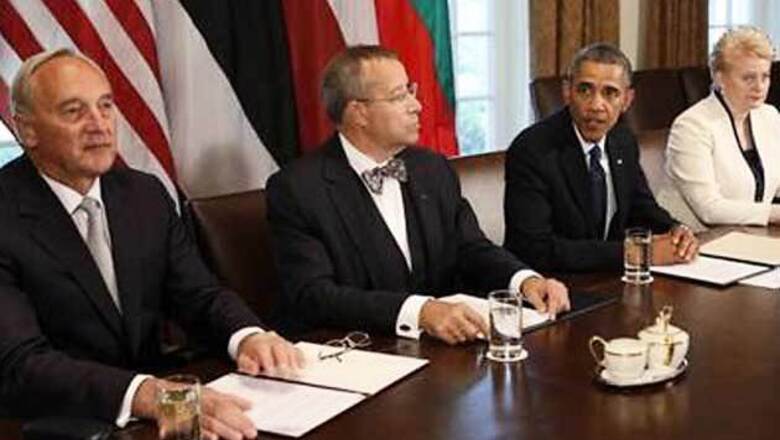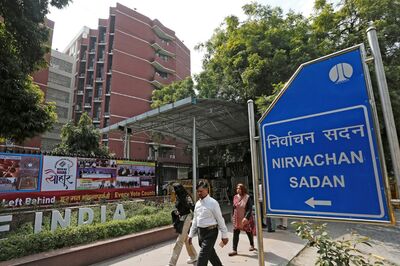
views
US intelligence agencies publicly disclosed on Friday some of the information that led to a "high-confidence" assessment that the government of Syrian President Bashar al-Assad carried out a chemical weapons attack on neighborhoods outside Damascus.
But the declassified intelligence report also showed what the US government does not have: clear evidence that Assad personally ordered the attack, and physiological evidence confirming what caused the deaths of an estimated 1,429 Syrians on August 21.
US officials insisted that because of the way the Syrian government and its chemical weapons program operates, Assad's government bears clear responsibility for the attack.
"We have a high-confidence assessment that a chemical weapons attack took place and that the Assad regime was responsible," a senior administration official told reporters in a conference call after the declassified intelligence report was released.
President Barack Obama's administration made clear on Friday that it would punish Assad for the "brutal and flagrant" attack.
The intelligence was compiled from human sources, electronic intercepts and satellite imagery, as well as public sources such as social media and reports by non-governmental organizations and medical groups.
US intelligence about weapons of mass destruction has been suspect since spy agencies, with encouragement from senior officials in President George W Bush's administration, reported in 2002 that Iraq had active chemical, nuclear and biological weapons programs. The findings were used to justify the 2003 US invasion to topple Saddam Hussein, but no such programs were discovered.
"Our intelligence community has carefully reviewed and re-reviewed information regarding this attack. And I will tell you it has done so more than mindful of the Iraq experience. We will not repeat that moment," Secretary of State John Kerry said on Friday.
A team of UN investigators in Damascus was due to leave Syria on Saturday, but a UN spokesman said it would take time to complete its analysis.
Two diplomats told Reuters that UN chief Ban Ki-moon informed the five permanent Security Council members that analysis of the samples collected by the inspectors could take up to two weeks.
Kerry said the team's mandate was limited to determining whether a chemical attack occurred - not who was responsible - and that Washington had no doubt on either score.
Syria's Foreign Ministry repeated the government's denial it had used chemical weapons and said Kerry's accusations were a "desperate attempt" to justify a military strike.
The four-page intelligence assessment did not include raw data, such as transcripts of intercepted communications, which US officials said must stay classified to protect sources and methods.
The document rejects allegations - made by the Syrian government and its ally Russia, among others - that anti-Assad rebels staged the attack. The rebels have neither the type of rockets and artillery used in the attack, nor the capability to fabricate videos seen on social media or symptoms verified by medical personnel, it said.
The intercepted communications showed the involvement of high-level Syrian government officials, US officials said.
"We intercepted communications involving a senior official intimately familiar with the offensive who confirmed that chemical weapons were being used by the regime on August 21st and was concerned with the UN inspectors obtaining evidence," a senior administration official said.
The officials also pointed to intelligence showing that, in the run-up to the attack, personnel from the Syrian government agency that conducts non-conventional weapons development and the Defense Ministry chain of command were involved in preparations. At some point, intelligence information also indicated that the Syrian chain of command ordered chemical weapons attacks to stop, they said.
Those events "implicate different individuals who have a connection to the Syrian regime and, specifically, its chemical weapons program," said one official, speaking on the condition of anonymity.
"It wasn't just the preparations that we detected in those three days in advance of Wednesday - it was also the people that were involved. They were the people that are responsible for his program. There is a chain of command from Assad to them," an official added.
US security sources said one Syrian official whose activities were under examination was Maher Assad, younger brother of the president and commander of Syria's Republican Guard and an elite armored division. What role, if any, he played in the attack is still unclear, they said.
In releasing the report, Obama and his aides were seeking to marshal public and congressional support for what Obama has said might be a "tailored, limited" military strike on Syria to deter further chemical weapons use.
The effort has been complicated by the Iraq experience, which helped drive Britain's decision on Thursday not to take part in any Syria campaign.
A declassified October 2002 US National Intelligence Estimate on Iraq's WMD programs said there was "high confidence" that Iraq was holding on to, and in some areas expanding, its chemical, biological, nuclear and missile programs.
The intelligence report on Syria released on Friday used the same terminology, adding, "Our high confidence assessment is the strongest position that the U.S. Intelligence Community can take short of confirmation."
The report said Syrian forces began making visible preparations for what turned out to be a chemical attack three days before the event, including "utilization" of gas masks.
Syrian government forces early on August 21 began to launch rockets and artillery from a government-controlled area against neighborhoods where rebels had maintained a stubborn and persistent presence, the report said.
One official said the government had been trying to clear the area of rebels for some time, possibly so that it could re-deploy its forces to crack down on rebels in the major Syrian city of Aleppo.
A few hours after the initial assault, social media began reporting what the United States now believes was a chemical attack from at least 12 locations in the Damascus area where suspected chemical-filled rockets were fired into rebel-controlled areas.
The intelligence report said a "nerve agent" was used in the attack, but did not specify which one and said the Syrian government maintains a stockpile of "numerous chemical agents" including mustard, sarin, and VX.




















Comments
0 comment